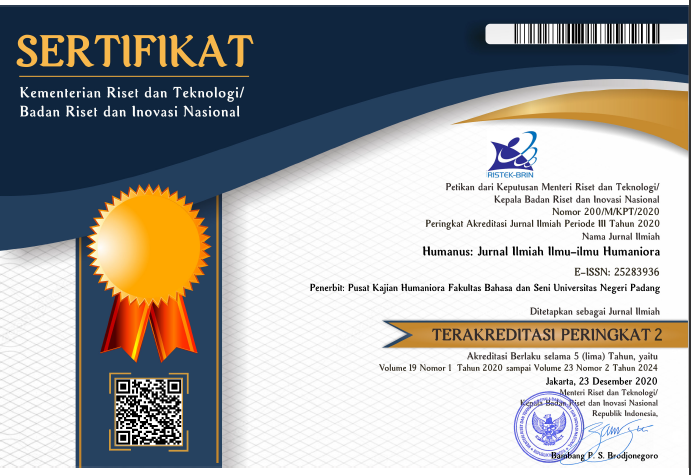Peace Corps Volunteers: Culture Shocks Encountered and Strategies to Overcome During Pre-Service Training in Indonesia
 ),
), (1) IAIN Kediri
 Corresponding Author
Corresponding Author
Copyright (c) 2021 Humanus
DOI : https://doi.org/10.24036/humanus.v20i1.109107
Full Text:
 Language : en
Language : en
Abstract
The purpose of the study is to examine the multifaceted reality of culture shocks experienced by Peace Corps Volunteers (PCV) during Pre-Service Training (PST) in Kediri, Indonesia and the strategies to overcome on a day to day basis. The research is descriptive in nature by semi-structured interviews and direct observation to PCV living in Kediri. The results of the research reveal that the culture shocks encountered are of three sorts: psychological, behavioral, and interpersonal communication change. Psychological change is of four kinds: using right-left hand, male-female interaction, asking personal privacy, and shake-hand. Moreover, the study also reveals three strategies to cope with culture shocks. They are self-confidence and optimism, accepting a new culture, and social support. It may be difficult to PCV to accept all differences with pleasure. However, a tolerant attitude and an open mind make them better to communicate with Community Liaison (CL). Eventually, by other people’s assistance, the PCV were able to encounter the culture shock.
Keywords
References
Adler, P.S. (1975). The Transitional Experience: An Alternative View of Culture Shock. Journal of Humanistic Psychology, 14 (4), 13-23.
Aronson, E., Wilson, T. D., & Akert, R, M. (2005). Social psychology (5th ed.). New Jersey: Pearson Education.
Belhadi, F., & Ayad. S. (2017). Culture Shock among International Students: A Case Study at The University of Tlemcen. Unpublished Master’s thesis. Faculty of Letters and Languages. University of Tlemcen.
Chun, C. Y. (2018). Cross -Cultural Adjustment of Expatriates: Theory &Research Findings on American and Japanese Expatriates. Seoul Journal of Business, vol.3 no.1.pp.150.
Chun, M., & Lai. (2011). A Study of Culture Shock, Culture Adjustment and Learning Strategy-The Experience of International Exchange Students Studying in the United States. Educational Research & Information, 11(1): 115-143.
Cohen, L., Davis, R., & Aboelata, M. (1998). Conflict Resolution and Violence Prevention: From Misunderstanding to Understanding, 84(1), 3-7.
Crawford, B.J. (2008). Exploring intercultural competence growth by non-mobile university students through interactions with dissimilar others. Unpublished Master’s thesis, University of Jyväskylä, Finland.
Ernofalina (2017) Culture Shocks Experienced by Indonesian Students Studying Overseas. International Journal of Educational Best Practices (IJEBP).Vol. 1 No. 2 October.
Ferraro, G. P. (2006). The cultural dimension of international business (5th ed.). New Jersey: Pearson Education.
Furnham, A., and Bochner, S. (1986). Culture Shock: Psychological Reactions to Unfamiliar Environments. London: Methuen.
Hess, J.D. (2004). The Whole World guide to Culture Learning. Yarmouth: Intercultural Press.
Hofstede, G. J.; Pedersen, P.B., & Hofsted, G., (2002). Exploring Culture. USA: Intercultural Press.
Kidder, L.H. (1992). Requirements for being Japanese: Stories of returnees. International Journal of Intercultural Relations,16, 384.
Mahadi, T, S., & Jafari, S. M. (2012). Language and Culture. International Journal of Humanities and Social Science, vol. 2 No. 17.
Mendenhall, M., & Oddou, G. (1986). Acculturation Profiles of Expatriate managers: Implications for Cross-Cultural Training Programs. Columbia Journal of World Business, 21(4), pp. 73-79.
Mendenhall, M.; Dunbar, E., & Oddou, G. (1987). Expatriate Selection, Training and Career Pathing: A Review And Critique. Human Resource Management, 26, pp. 331-345.
Milton, T.J. (1998). Understanding Culture Shock. FAO Journal, vol.2 p. 11-14.
Oberg, K. (1960). Culture Shock: Adjustment to New Cultural Environments. Practical Anthropology. 7, 142-146.
Pugh, A. (2009) Longing and Belonging. Berkeley: University of California Press.
Rajasekar, J., & Renand, Franck. (2013). Culture Shock in Global World, International Journal of Business and Management (IJBM), vol. 8, no.13.
Ryan, Sherry D., Magro, Michel J., & Sharp, Jason H. (2011). Exploring Educational and Cultural Adaptation through Social Network Sites. Journal of Information Technology Education: Innovation in Practice, vol.10.p.5-6.
Trompenaars, F. (2006). The culture shock of mergers and acquisitions. Alexander Hughes European News letter. V. 29: 3-4.
Xia, J. (2009). Analysis of Impact of Culture Shock in Individual Psychology. International Journal of Psychological Studies, Vol.1 no.2.pp. 99-101.
 Article Metrics
Article Metrics
 Abstract Views : 734 times
Abstract Views : 734 times
 PDF Downloaded : 143 times
PDF Downloaded : 143 times
Refbacks
- There are currently no refbacks.
Copyright (c) 2021 Humanus

This work is licensed under a Creative Commons Attribution-NonCommercial 4.0 International License.










